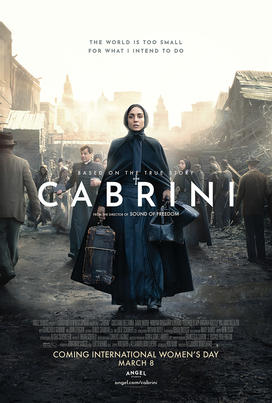Screenwriter Rod Barr ’86 Has Learned to Trust His Creative Instincts
Following ‘Sound of Freedom,’ Barr is back with a new film, ‘Cabrini’
Six years ago, Rod Barr ’86 was approached by an executive producer and financier, Eustace Wolfington, asking if he had interest in writing the script for a film about Frances Xavier Cabrini, an Italian nun whose philanthropic work spawned a vast network of missionary institutions that housed, cared for, and educated tens of thousands of poor immigrant children around the world. Mother Cabrini, as she came to be known, was canonized as a saint by Pope Pius XII in 1946 — almost 30 years after her death. She became the first American citizen to achieve sainthood. Four years later, the pope recognized her as the patroness saint of immigrants.
Barr, a screenwriter and creative wunderkind dating to his days as a Princeton English major, was duly impressed by the scope of Cabrini’s good deeds but wasn’t sold on Wolfington’s idea.
“It seemed like a nun movie, and I didn’t want to make a nun movie,” Barr says. “I thought it was going to be a boring, pious, typical fairy-tale thing about a saint.”
And then Barr, a deeply spiritual man, says he had an epiphany, calling on him to “‘pay attention to this project, despite what you think.’ So, I did.” Barr realized Cabrini’s story was not so much a “nun movie” as it was a movie about a remarkable woman who happened to be a nun. He came to see it as the quintessential underdog story, based on the life of a brave and indefatigable social crusader who grew up as a frail, sickly girl, one of 13 children born to a poor farm family in the Lombardy region of Italy. She and a coterie of other women formed the Missionary Sisters of the Sacred Heart of Jesus and set out for New York in 1889, determined to be champions of love, compassion, and hope for newly arrived immigrants, mostly Italian, who lived like vermin amid abject squalor and disease, widely viewed as an olive-skinned plague at the bottom rung of New York’s socioeconomic ladder. The more Barr learned about Mother Cabrini’s life, the more he admired her willingness to take on anyone and anything in her way — whether it was the Catholic Church hierarchy, the mayor, a hard-hearted city bureaucracy, even the pope himself — in pursuit of her Christian values and service.
“If you were a suffering human being, she felt called to help,” Barr says.
Directed by Alejandro Monteverde for Angel Studios, an independent media company, Cabrini offers cinematic testimony not only to the difference one person can make, but to the idea of female empowerment in the face of unrelenting condescension and paternalism by a parade of powerful men.
“It’s a shame you are a woman, Mother. You’ve would made an excellent man,” says the New York City mayor (played by John Lithgow) to Cabrini near the end of the film.
That Cabrini premiered on March 8, International Women’s Day, was not an accident.

Growing up in Cincinnati, Barr manifested a diverse set of creative skills long before he got to Princeton. Apart from his love of writing, he was an accomplished musician who composed and recorded a jazz song when he was 17 years old, performing all of the tracks — guitar, bass, piano — himself. At Princeton, he teamed up with two of his best friends, Dave McShea ’85 and Bruce Judge ’86, plus David Duquette ’86 and Clif Swiggett ’85to form a band called 3 Guys Named Burt. The band included nobody named Burt but did have regular gigs around campus, playing original compositions that showcased Barr’s virtuoso guitar skills, especially at one memorable appearance on the lawn behind Spelman Hall in May 1985.
After graduation, Barr wrote young adult novels and then formed a video game company, coming up with characters and storylines, before he felt compelled to be a full-time screenwriter. Judge describes Barr as an “interesting combination of creative inspiration and discipline” — an artist capable of soaring achievements, but who also worked diligently at his craft, whether as a writer or musician.
McShea agrees, calling Barr “creative in a way that’s mind-boggling.”
Few people know more about how Barr’s mind works than Monteverde, a Mexican director who has known him for close to 20 years and collaborated with him on a number of films, most notably Sound of Freedom, a 2023 release about child trafficking that became a surprise, and hotly controversial, blockbuster, grossing almost $250 million worldwide, making it one of the most successful independent films in history. No small part of that success, especially in the U.S., came from the way it was embraced by the far right, who viewed it as an affirmation of QAnon’s conspiracy ideologies. A web of conspiracy theories about the film itself took root, with people’s perspective on Sound of Freedom becoming a litmus test of their political beliefs.
The controversy surrounding the film has abated. “It’s not a red state phenomenon anymore,” Barr says, but he believes it was completely baseless, and manufactured, to begin with.
“We had never even heard of QAnon [when we were making this film]. It didn’t exist for us. The idea that it had something to do with that is impossible on top of being absurd. It just shows how the deeply divided nature of our culture exacerbates the way people respond to things.”
In a guest column for The Hollywood Reporter last summer, Monteverde and Barr dismissed the notion that the film had any political agenda. “The movie ... was not made for Republicans or Democrats. It was made for human beings, because child trafficking is an issue whose moral imperative is obvious to the human heart,” they wrote.
It’s Barr’s heart and humanity, according to Monteverde, that powers the quality of his work. “He’s an incredible writer who is connected to his emotions and that shows in the depth of his characters,” Monteverde says. “He has found a way to make a screenplay read like a piece of literature. I don’t see myself working with anybody else. He’s one of the greatest screenwriters in the business.”
Monteverde also has Barr to thank for introducing him to meditation, a practice that Barr has been a devotee of for years, and that Monteverde says has changed his life.
Decades before he had his revelatory moment and did an about-face on Cabrini, Barr, freshly graduated from Princeton, felt an altogether different calling – to go to South Pole Station in Antarctica. He spent a total of four months there, sometimes in wind chill temperatures that reached -100 degrees. It appealed to his sense of adventure, and became its own sort of meditation.
“There’s nothing else in the world quite like it,” Barr says. “You take off from the coast of the continent and fly three hours over absolute emptiness to land at the Pole, which is this tiny outpost in the middle of the Antarctic plateau. It’s like landing on an aircraft carrier in the middle of the Pacific — if the Pacific were frozen white. The solitude is amazing.”
McShea, one of the three non-Burts, considers Barr one of the most grounded people he has ever known. “He has a very strong internal compass,” McShea says. Ultimately, it was what convinced him to work on Cabrini, The Sound of Freedom, and every other film he has undertaken.
“At a certain point, the projects choose you — and your job is to consent to the ride,” Barr says.












1 Response
Zanthe Taylor ’93
1 Year AgoAn All Male Article?
I had seen posters for the film Cabrini and was tickled to learn the writer is a fellow Tiger (“Screenwriter Rod Barr ’86 Has Learned to Trust His Creative Instincts,” June issue). But your article surprised me. Here is a movie about a groundbreaking woman, yet not once do you mention a single woman involved in the project — not even which actor plays Frances Cabrini in the film. The financier, producer, director, and everyone you interview is male, and the only actor you mention is John Lithgow, who doesn’t play the title character.
As I looked in vain for a clue to who plays Cabrini, it struck me how much this reminded me of the way women were largely erased from the cultural landscape during my childhood and much of my adult life. How ironic, since this is the tale, as you write, about “female empowerment in the face of unrelenting condescension and paternalism by a parade of powerful men.” But surely it matters how you tell the story, not just that you do.